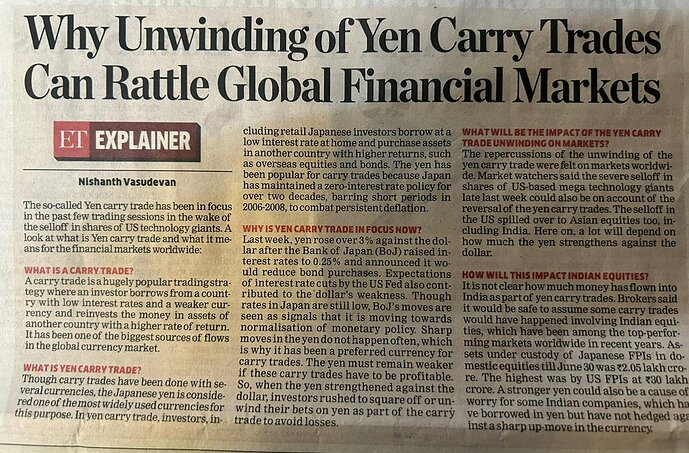The Japanese Yen’s recent appreciation and the Bank of Japan’s (BOJ) decision to hike interest rates have led to a noticeable downturn in the Nikkei stock index today.
History of Yen Carry Trade:
The carry trade has played a significant role in the yen’s valuation over the past few decades. In the 1990s, Japanese housewives, known collectively as “Mrs. Watanabe,” pioneered the carry trade strategy. They borrowed yen at low interest rates and invested in higher-yielding currencies like the Australian dollar, pocketing the difference in interest rates (IdeaWeb) (uQualify).
This strategy was highly profitable as long as the yen remained weak. However, during financial crises, such as the Russian financial crisis in 1998 and the global financial crisis in 2008, the yen appreciated sharply as investors sought safe-haven assets. This sudden appreciation led to significant losses for carry traders who had to repay their yen-denominated loans at a higher exchange rate qualify & Oanda.
Today, the effects of these financial strategies are evident. The BOJ’s interest rate hike has led to an appreciation of the yen, which in turn has caused the Nikkei to decline. Export-dependent companies are seeing reduced profits due to the stronger yen, which makes their products more expensive abroad. Higher interest rates also mean higher business borrowing costs, leading to reduced investment and slower economic growth.
The current economic environment is marked by volatility and uncertainty. As the BOJ continues to navigate between controlling inflation and supporting economic growth, the yen’s strength and its impact on the Nikkei will remain critical areas of focus.
The appreciation of the yen and the BOJ’s interest rate hike have had immediate repercussions on the Japanese stock market, particularly the Nikkei index.
Here’s a good article on how the unwinding of yen carry trades will have an impact on financial markets.
Understanding the historical context of the carry trade and its impact on the yen provides valuable insights into the current economic landscape.
Hows your portfolio doing today? And is the end of bull market ?
